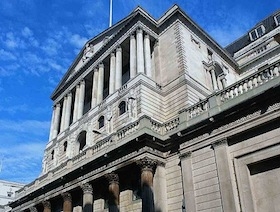The Bank of England held interest rates at 0.5 per cent today and also announced it would revive its Quantitative Easing programme, pumping billions of pounds into the economy.
The Bank of England's Monetary Policy Committee voted to increase the size of its asset purchase programme, financed by the issuance of central bank reserves, by £50 billion to a total of £375 billion.
The Bank of England says that UK output has barely grown for a year and a half and is estimated to have fallen in both of the past two quarters.
The pace of expansion in most of the United Kingdom's main export markets also appears to have slowed. Business indicators point to a continuation of that weakness in the near term, both at home and abroad. In spite of the progress made at the latest European Council, concerns remain about the indebtedness and competitiveness of several euro-area economies, and that is weighing on confidence here.
The correspondingly weaker outlook for UK output growth means that the margin of economic slack is likely to be greater and more persistent, says the bank.
CPI inflation fell to 2.8% in May and is likely to edge down further in the near term. Commodity prices have fallen, which should help to moderate external price pressures. And pay growth remains subdued. Given the continuing drag from economic slack, that should ensure inflation continues to ease into the medium term.
At its meeting today, the Committee agreed that the Funding for Lending Scheme, which would be launched shortly, was a welcome initiative. It also noted recent and prospective actions to ease liquidity constraints within the banking system.
Taken together with reduced pressure on household real incomes, on the back of lower commodity prices, and the continued stimulus from past monetary policy actions, that should sustain a gradual strengthening of output growth.
But against the background of continuing tight credit conditions and fiscal consolidation, the increased drag from the heightened tensions within the euro area meant that, without additional monetary stimulus, it was more likely than not that inflation would undershoot the target in the medium term.
The Committee therefore voted to increase the size of its programme of asset purchases, financed by the issuance of central bank reserves, by £50 billion to a total of £375 billion. The Committee also voted to maintain Bank Rate at 0.5%. The Committee expects the announced programme of asset purchases to take four months to complete. The scale of the programme will be kept under review. The minutes of the meeting will be published at 9.30am on Wednesday 18 July.

